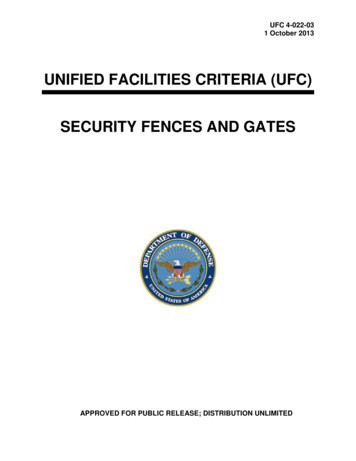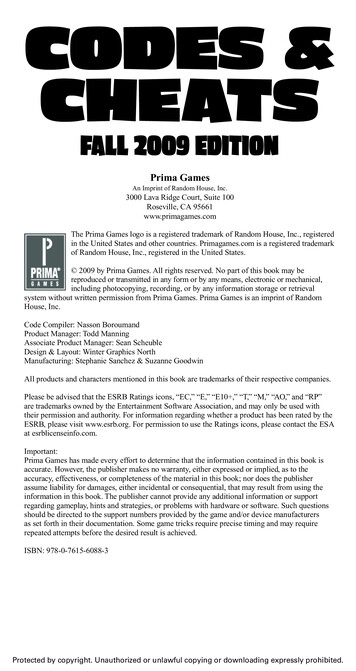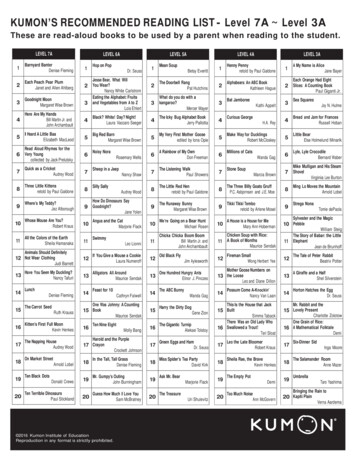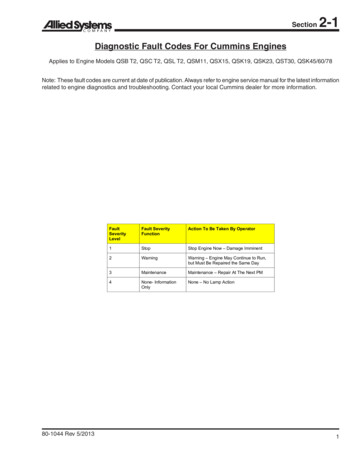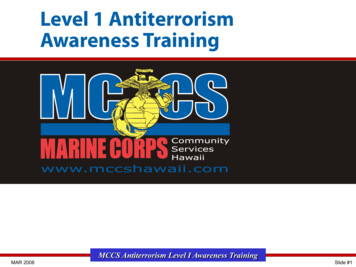
Transcription
Level 1I rainingTrainingMr. Bernie MayerMCCS Antiterrorism Training Officermayerbm@usmc- mccs.org451 - 5077, ext 233MCCS Antiterrorism Level I Awareness TrainingMAR 2008Slide #1
IntroductionAbout This Training Designed to increaseawareness of terrorismand improve ability toapply personalprotective measures. Meets the annualrequirement for Level IAntiterrorism trainingprescribed by DoDI2000.16.MCCS Antiterrorism Level I Awareness TrainingMAR 2008Slide #2
IntroductionLearning Objectives Understand the terrorist threat. Understand how to lower yourvulnerability. Proper responses to situationbased terrorist threat actions. Understand Base securitymeasures.MCCS Antiterrorism Level I Awareness TrainingMAR 2008Slide #3
IntroductionLesson MapIntroductionScenarioDiscussionQuestionsMCCS Antiterrorism Level I Awareness TrainingMAR 2008Slide #4
DoD Definition of Terrorism“The calculated use of unlawfulviolence or threat of unlawfulviolence to inculcate fear; intendedto coerce or intimidategovernments or societies in thepursuit of goals that are generallypolitical, religious, or ideological.”MCCS Antiterrorism Level I Awareness TrainingMAR 2008Slide #5
What do TerroristsLook Like? Terrorists don’t havea ‘specific’appearance. Any organizationcan use terrorism toachieve its goals. Criminal actionsseparate ‘terrorists’from legitimategroups.PLO TerroristsMCCS Antiterrorism Level I Awareness TrainingMAR 2008Slide #6
MCCS Antiterrorism Level I Awareness TrainingMAR 2008Slide #7
TAKE YOUR PICKOKLAHOMAUSAAFRICACHECHNARAMALLA, PALESTINE1ST FEMALE BOMBERJan 2002MCCS Antiterrorism Level I Awareness TrainingMAR 2008Slide #8
SUSPICIOUS ACTIVITYSURVEILLANCESUSPICIOUS QUESTIONINGTESTS OF SECURITYACQUIRING SUPPLIESID’sSUSPICIOUS PERSONSDRY RUNSDEPLOYING ASSETSMCCS Antiterrorism Level I Awareness TrainingMAR 2008Slide #9
“ T H E K E Y I S P UB L I C A W A R E N E S S ”IF YOU OBSERVE ANYSUSPICIOUS ACTIVITY ORINCIDENT– PLEASE CALL!451 - 3333 / 911ImmediatelyC a m p L e je u n e E m e r g e n c y D i s p a tc hMCCS Antiterrorism Level I Awareness TrainingMAR 2008Slide #10
AMAZING REALITY:IN ISRAEL: Over 70% of terrorist operationsare STOPPED! Young and old are part of aNation-wide Awareness Program Every incident is taken seriouslyand thoroughly investigatedMCCS Antiterrorism Level I Awareness TrainingMAR 2008Slide #11
IntroductionTarget SelectionMCCS Antiterrorism Level I Awareness TrainingMAR 2008Slide #12
IntroductionTarget IdentificationMCCS Antiterrorism Level I Awareness TrainingMAR 2008Slide #13
IntroductionDOD Terrorism Threat LevelsHighConsider aterrorist group’s:Significant OperationalcapabilityModerateLowIncreasingThreat Activities Intentions EnvironmentMCCS Antiterrorism Level I Awareness TrainingMAR 2008Slide #14
IntroductionForce Protection ConditionsSampleprotective measures: Gate guardsBarriersIncreasingID checksProtectionVehicle inspectionsPatrolsPlan rehearsalsDeltaCharlieBravoAlphaNormalMCCS Antiterrorism Level I Awareness TrainingMAR 2008Slide #15
MCCS Antiterrorism Level I Awareness TrainingMAR 2008Slide #16
IntroductionFPCON Normal When there is ageneral global threatof possible terroristactivity, but it warrantsonly a routine securityposture– A terrorist attack isalways possible– Best informationavailable offers noindication ofprobable attackExpect to see a routinesecurity postureMCCS Antiterrorism Level I Awareness TrainingMAR 2008Slide #17
IntroductionFPCON Alpha When there is a generalthreat of possible terroristactivity, the nature andextent of which areunpredictable, againstpersonnel and facilities– General conditionssuggest possible violence– Nothing indicates thatthis installation istargeted– Must be capable of beingmaintained indefinitelyExpect random vehicle checks andincreased crime prevention effortsMCCS Antiterrorism Level I Awareness TrainingMAR 2008Slide #18
IntroductionFPCON Bravo When an increased andmore predictable terroristthreat activity exists– Specific informationsuggests probable violence– Nothing indicates that thisinstallation is targeted– Extra precaution isappropriate to deter terroristplanning– Must be capable of beingmaintained for weekswithout hardshipExpect to see closer inspection ofvehicles and deliveries, ID checks,and a greater presence of guardson your installationMCCS Antiterrorism Level I Awareness TrainingMAR 2008Slide #19
IntroductionFPCON Charlie When an incident occurs orwhen intelligence indicatesthat some form of terroristtargeting against personneland facilities is imminent– Evidence of terrorist attackplanning, such as terroristsurveillance or reports fromlocal sources– Strong protective measuresare required, but the unit mustcontinue its regular missionactivities– Implemented for a short timeExpect rigorous efforts toinspect vehicles and facilities(CDC, Base Quarters, Pay)MCCS Antiterrorism Level I Awareness TrainingMAR 2008Slide #20
IntroductionFPCON Delta When a terrorist attack hasoccurred or intelligenceindicates imminentterrorist action against aspecific location– Normally, FPCON Delta isused as a localized warning– The installation moves to ahigh state of alert, andimplements mandatorysecurity measures– Commanders encouraged tosupplement mandatorysecurity measuresAdditional security measuresdelay and interrupt normal routinesMCCS Antiterrorism Level I Awareness TrainingMAR 2008Slide #21
IntroductionRandom Antiterrorism MeasuresForce Protection Condition Normalplus random antiterrorism measuresdayMondayTuesday Wednesday ThursdayFridaySaturdaySunRoll outClose rriersinspections IDIDvehiclecheckschecksinspectionsMCCS Antiterrorism Level I Awareness TrainingMAR 2008Slide #22
Department of HomelandSecurity Advisory System- SCHOOLS- TRANSPORTATION- POPULATED AREAS- WATER SOURCES- POWER SUPPLY- CYBER / COMPUTER- FINANCIAL CENTERS- HISTORICAL- GOVERNMENT / DoDMCCS Antiterrorism Level I Awareness TrainingMAR 2008Slide #23
Civilian ScenarioTaking Public Transportation–Have a plan and move from onesecure location to the next.–Travel in small groups, in securewell-lit public areas.–Change times and routes.–Lock your compartment door.–Report any suspicious activity.MCCS Antiterrorism Level I Awareness TrainingMAR 2008Slide #24
Civilian ScenarioAntiterrorism SafetyWhile traveling, keep goodantiterrorism practices in mind!–Don’t travel alone.–Conceal your Identification.–Conform to local culture.–Do not bring attention to yourself.–Be aware of suspicious behavior.MCCS Antiterrorism Level I Awareness TrainingMAR 2008Slide #25
Civilian ScenarioAntiterrorism Safety (cont)Be prudent, be a hard target, andreport suspicious activity!–Avoid public disturbances andpolitical demonstrations.–Avoid religious sites where yourpresence may be offensive.MCCS Antiterrorism Level I Awareness TrainingMAR 2008Slide #26
Responding to an attack! CHEMICAL BIOLOGICAL NUCLEAR / RADIOLOGICALMCCS Antiterrorism Level I Awareness TrainingMAR 2008Slide #27
Responding to a ChemicalWeapons AttacksIf you feel you have been exposed tochemical agents MCCS Antiterrorism Level I Awareness TrainingMAR 2008Slide #28
you should Move upwind in an area with goodventilation. Move to a higher elevation. Cover as much of your body as possible. Wash areas in contact with chemicalagents with warm soapy water. Seek medical attention. Know your local plans for responding tothese threats.MCCS Antiterrorism Level I Awareness TrainingMAR 2008Slide #29
Responding to a BiologicalWeapons AttackIf you feel you have been exposed tobiological agents MCCS Antiterrorism Level I Awareness TrainingMAR 2008Slide #30
you should Quickly get away and warn othersof the threat. Protect yourself and cover your mouthand nose. Wash areas that came into contactwith the substance with soap and water. Contact authorities. Seek medical attention.MCCS Antiterrorism Level I Awareness TrainingMAR 2008Slide #31
Responding to a Nuclear /Radiological Weapons AttackIf you feel you have been exposed to anuclear / radiological weaponsattach MCCS Antiterrorism Level I Awareness TrainingMAR 2008Slide #32
you should Determine whether to leave the area or takeshelter in a building. Cover your nose and mouth. In a building, close all doors and windows, andturn off heating, ventilation, and air conditioning. In a nuclear attack, stay on the first floor or go tothe basement. If exposed to radioactive materials, take yourclothes off and wash as soon as possible. Monitor news broadcasts and follow instructions.MCCS Antiterrorism Level I Awareness TrainingMAR 2008Slide #33
BOMB THREAT!MCCS Antiterrorism Level I Awareness TrainingMAR 2008Slide #34
TELEPHONIC BOMB THREAT STAY CALM! IMPLEMENT BOMB THREATCHECKLIST. NOTIFY FELLOW WORKERS TO CALL 911ON ANOTHER PHONE TO REPORT THEINCIDENT. 911 DISPATCH WILL CALLTELEPHONE REPAIR TO INITIATE A PHONETRACE ON THE BOMB THREAT LINE. EVACUATE BUILDING OR AREATHREATENED.MCCS Antiterrorism Level I Awareness TrainingMAR 2008Slide #35
CALL TRACE PROCEDURES WHEN THE CALLER HANGS UP, DO NOTHANG UP PHONE! “HOOK FLASH” YOURPHONE AND DIAL *57 TO ACTIVATETRACE THROUGH TELEPHONE REPAIR. DO NOT USE THAT PHONE LINE AGAIN!USE ANOTHER LINE AND CALL 911 ANDASK FOR THE PMO DESK SGT TO ENSURECALL TRACE WAS ACTIVATED AND TOREPORT BOMB THREAT CALL.MCCS Antiterrorism Level I Awareness TrainingMAR 2008Slide #36
SUSPICIOUSPACKAGES / OBJECTS DO NOT move, jar or touch asuspicious package / object oranything attached to it. Call 911! Report the location, with anaccurate description of the object. Evacuate the building or area. If you can see the bomb, the bombcan see you, and could cause injury.MCCS Antiterrorism Level I Awareness TrainingMAR 2008Slide #37
!! SUSPICIOUS PACKAGES !!IF SUSPICIOUS – DO NOT OPENNO Return Address orUnknown Sender. Overseas ings or Stamps Contents are unusualor suspicious! Powdery substanceor grease marks onthe box or envelopeMISPELLEDCOMMON WORDSOR NAMESMCCS Antiterrorism Level I Awareness TrainingMAR 2008Slide #38
Suspicious Package at BasePost OfficeNellis AFB, NV29 Sep 2005MCCS Antiterrorism Level I Awareness TrainingMAR 2008Slide #39
MCCS Antiterrorism Level I Awareness TrainingMAR 2008Slide #40
Civilian ScenarioAirplane HijackingIdeas for immediateresponse: Be alert, remaincalm. Hide your ID. Encourage othersto remain calm. Try to understandthe developingsituation.MCCS Antiterrorism Level I Awareness TrainingMAR 2008Slide #41
Protecting PersonalInformation and Property Shred all paper trash with personalinformation (SSN, Financial info). Discard all electronic media (Thumbdrives, CDs) in a matter not to beobserved or reproduced. ‘Always’ leave your computer and yourvehicles locked and secured. Maintain your CAC card on yourpossession when not in use.MCCS Antiterrorism Level I Awareness TrainingMAR 2008Slide #42
SCENARIOWHATWOULD YOUDO!?MCCS Antiterrorism Level I Awareness TrainingMAR 2008Slide #43
Civilian ScenarioYou have been directed to go toWashington, DC for a conference! Air travel Ground travel Hotel security Vehicle bomb Government facility Hostage survival Returning homeYou will encountersituationspertaining to all ofthe followingMCCS Antiterrorism Level I Awareness TrainingMAR 2008Slide #44
Antiterrorism ThemesBlend in, don’t be aneasy targetThink ahead andchoose safer optionsLook for suspiciouspersons / activitiesPrevent crime,maintain securityChange routinesCooperate withauthoritiesMCCS Antiterrorism Level I Awareness TrainingMAR 2008Slide #45
Civilian ScenarioPacking for the TripMCCS Antiterrorism Level I Awareness TrainingMAR 2008Slide #46
Civilian ScenarioWhat should you pack?1)Wear a polo shirt and windbreakerdisplaying your DoD agency emblem;pack a suitcase with a big militarysticker.2)You wear a military flight jacket, andpack a duffel bag.3)Wear casual clothing, giving theappearance to blend in with the localpopulation; pack a plain suitcase withcovered nametags.MCCS Antiterrorism Level I Awareness TrainingMAR 2008Slide #47
Civilian ScenarioChoosing a SeatWhat seat would you choose?MCCS Antiterrorism Level I Awareness TrainingMAR 2008Slide #48
Moving Through theAirport TerminalCivilian ScenarioThere is a commotion at thesecurity gate MCCS Antiterrorism Level I Awareness TrainingMAR 2008Slide #49
Civilian Scenario what should you do?1)Show your DoD ID, take control,and try to calm the people down.2)Wait and allow securitypersonnel to handle it. Leave ifsituation worsens.3)Tell them to hurry up becauseyou have a plane to catch.MCCS Antiterrorism Level I Awareness TrainingMAR 2008Slide #50
Civilian ScenarioAirplane HijackingThe plane has been hijacked MCCS Antiterrorism Level I Awareness TrainingMAR 2008Slide #51
Civilian Scenario what do you do?1. Show your ID, take charge of thesituation and yell out your demands.2. Do not encourage others to remaincalm, the more confusion the better.3. Be alert, remain calm and encourageothers to do the same. Hide your ID.4. Hide in the bathroom.MCCS Antiterrorism Level I Awareness TrainingMAR 2008Slide #52
Interacting WithLocal AuthoritiesCivilian ScenarioThe hijacking situation has beenresolved, you are talking with localauthorities MCCS Antiterrorism Level I Awareness TrainingMAR 2008Slide #53
Civilian Scenario what should you do?1) You saw and heard nothing,tell them to leave you alone.2) Cooperate and provide yourcontact information, with anaccount of events.3) Tell them to contact yourboss or the US Government.MCCS Antiterrorism Level I Awareness TrainingMAR 2008Slide #54
Civilian ScenarioRenting a vehicleYou are deciding which car to rent,you wisely decided not to rent thered sports car MCCS Antiterrorism Level I Awareness TrainingMAR 2008Slide #55
Civilian Scenario which car should you choose?1)An older model car from adiscount car rentalcompany.2)A new, oversized SUV.3)A recent model, mediumsize, sedan.MCCS Antiterrorism Level I Awareness TrainingMAR 2008Slide #56
Civilian ScenarioTaking a TaxiIf you need to take a taxiduring your trip MCCS Antiterrorism Level I Awareness TrainingMAR 2008Slide #57
Civilian Scenario what are some important factorsto consider when using a taxi?1)Take the taxi recommended bythe airport staff.2)Take the best offer to save asmuch money as possible.3)Look for the distinctivemarkings of a legitimate taxicompany (logos, color, vehicletype).MCCS Antiterrorism Level I Awareness TrainingMAR 2008Slide #58
Civilian ScenarioInspecting Your VehicleYou know you should inspect andfamiliarize yourself with your rental car MCCS Antiterrorism Level I Awareness TrainingMAR 2008Slide #59
Civilian Scenario when do you inspect yourrental vehicle?1) Prior to leaving the rental carparking lot and every time thevehicle is left in an unsecuredlocation.2) After you have driven the car andthe car is parked in an unsecuredlocation.3) At the earliest convenient time.MCCS Antiterrorism Level I Awareness TrainingMAR 2008Slide #60
Civilian ScenarioDriving Under SurveillanceYou suspect that you are being tailed –you know that you should not try to outrunthe other vehicle MCCS Antiterrorism Level I Awareness TrainingMAR 2008Slide #61
Civilian Scenario what should you do?1) Drive at normal speed to a publiclocation or authorities, avoidingchokepoints and getting boxed in.2) Slow down and let the truck pass,make eye contact with driver, get adescription of the driver.3) Turn off onto a side street and parkin an alley to lose the pursuer.4) Speed away as fast as you can.MCCS Antiterrorism Level I Awareness TrainingMAR 2008Slide #62
Civilian ScenarioCiviSCENARIOHOTELSECURITYMCCS Antiterrorism Level I Awareness TrainingMAR 2008Slide #63
Civilian ScenarioChoosing a RoomYou are checked Into the hotel –your room is on the first floorbut you have the option to change MCCS Antiterrorism Level I Awareness TrainingMAR 2008Slide #64
Civilian Scenario what room should you choose?1. Keep exterior first floor room.2. Trade for one on the 4th floor, near a fireexit, that opens to the hotel interior.3. Trade for one on the 4th floor, near theelevators, that opens to the exterior of thehotel.4. Trade for one on the 12th floor, near theelevators, that opens to interior of thehotel.MCCS Antiterrorism Level I Awareness TrainingMAR 2008Slide #65
Civilian ScenarioInspecting Your RoomYou are in your hotel room MCCS Antiterrorism Level I Awareness TrainingMAR 2008Slide #66
Civilian Scenario what should you check?1) Operational locks on doors, balcony, andwindows. Ensure phone works and thatyou know how to place emergency calls.2) Operational locks on doors and windowsEnsure television and telephone work.3) Operational locks on the door. Ensure thetelevision works. Look for a lock box andmini-bar in the room. Also, ensure phoneworks.MCCS Antiterrorism Level I Awareness TrainingMAR 2008Slide #67
Civilian ScenarioDining OutA stranger starts asking you questionsabout your work.MCCS Antiterrorism Level I Awareness TrainingMAR 2008Slide #68
Civilian Scenario how should you respond?1) Don’t say anything! Just eat yourfood and ignore the stranger.2) Engage in some conversation, butdo not talk about anythingpersonal or about your purpose.3) Have a few drinks and tell themanything they want to know.4) All of the aboveMCCS Antiterrorism Level I Awareness TrainingMAR 2008Slide #69
Civilian ScenarioReturning to Your RoomYou are heading back to your room and notice asuspicious stranger from dinner in the lobby MCCS Antiterrorism Level I Awareness TrainingMAR 2008Slide #70
Civilian Scenario how should you proceed?1) Approach stranger and let them knowthat you are alert to their behavior.2) Avoid the individual completely. Yelland run to your room!3) Report them to the front desk ormanagement; take an indirect routeback to your room; inform authoritieswith a description.MCCS Antiterrorism Level I Awareness TrainingMAR 2008Slide #71
Civilian ScenarioComplying with EvacuationInstructionsA known security guard enters your areaand tells you to evacuate the building MCCS Antiterrorism Level I Awareness TrainingMAR 2008Slide #72
Civilian Scenario what do you do?1) Quickly secure personal information,and exit down the rear staircase.2) Ask the security guard for anexplanation before complying.3) Wait and see what other people do, itmight be a false alarm or just a drill.4) All of the above.MCCS Antiterrorism Level I Awareness TrainingMAR 2008Slide #73
Civilian ScenarioCiviSCENARIOVehicleImprovisedExplosive DeviceMCCS Antiterrorism Level I Awareness TrainingMAR 2008Slide #74
MCCS Antiterrorism Level I Awareness TrainingMAR 2008Slide #75
Civilian ScenarioFinding a Suspicious PackageYou are inspecting your car and find asuspicious package MCCS Antiterrorism Level I Awareness TrainingMAR 2008Slide #76
Civilian Scenario what should you do?1) Carefully remove the box and callthe police to confiscate it.2) Evacuate the area; tell the hotelstaff there is an unidentifiedpackage under your vehicle andhave them contact the authorities.3) Perform a careful inspection of thebox, looking for protruding wires,no return address, and oil spots.MCCS Antiterrorism Level I Awareness TrainingMAR 2008Slide #77
Civilian ScenarioGovernment FacilityMCCS Antiterrorism Level I Awareness TrainingMAR 2008Slide #78
Civilian ScenarioApproaching the GateSecurity appears tight MCCS Antiterrorism Level I Awareness TrainingMAR 2008Slide #79
Civilian Scenario what do you do?1) You show your irritation to the guardfor being delayed, while you scramblefor ID.2) Get out of your car and direct traffic, tohelp speed up procedures at the gate.3) Stay in your car, provide ID for alloccupants, and cooperate with guardinstructions. Remain alert forsuspicious activities.MCCS Antiterrorism Level I Awareness TrainingMAR 2008Slide #80
Civilian ScenarioDetecting SurveillanceA suspicious man at the bus stopseems to be watching the base MCCS Antiterrorism Level I Awareness TrainingMAR 2008Slide #81
Civilian Scenario what do you do?1) Carefully get out of line and driveaway from the base, passing thestranger and getting a thoroughdescription for the security forces.2) Tell the security guard what youhave seen and provide a descriptionof the individual.3) Do nothing; he is probably waitingfor another bus.MCCS Antiterrorism Level I Awareness TrainingMAR 2008Slide #82
Civilian ScenarioNoticing a ViolationYou are at the conference facility andnotice a door propped open with a box MCCS Antiterrorism Level I Awareness TrainingMAR 2008Slide #83
Civilian Scenario what do you do?1) Remove the box, then point outthe security violation to one ofthe conference managers.2) Stay near by and keep an eye onthe door yourself.3) Point out the security violationto one of the conferencemanagers or security.MCCS Antiterrorism Level I Awareness TrainingMAR 2008Slide #84
Civilian ScenarioCiviSCENARIOHostageSurvival!MCCS Antiterrorism Level I Awareness TrainingMAR 2008Slide #85
Civilian ScenarioReceiving a Delivery at YourHotel Room!There is a knock at your door froma hotel employee who has a package foryou MCCS Antiterrorism Level I Awareness TrainingMAR 2008Slide #86
Civilian Scenario how should you respond?1) Tell him to leave it outside your doorand you will get it later.2) Open the door and tell the person towait, call the front desk to confirm theidentity of the sender and delivery.3) Tell him to leave it at the front deskand you will get it later. Then call thefront desk to confirm the packagesender and addressee. If not urgent,get it in the morning.MCCS Antiterrorism Level I Awareness TrainingMAR 2008Slide #87
Civilian ScenarioResponding to a ThreatBefore you can respond, two men haveentered your unlocked door pointing a gun MCCS Antiterrorism Level I Awareness TrainingMAR 2008Slide #88
Civilian Scenario how do you respond?1) Since you are faced with deadlyforce, do not resist as the intruderssearch your room and belongings.2) Try to catch one of them off guardand hit him with something, then runout the door.3) Grapple with one of the intruders forcontrol of his weapon.MCCS Antiterrorism Level I Awareness TrainingMAR 2008Slide #89
Civilian ScenarioReturning Home / WorkMCCS Antiterrorism Level I Awareness TrainingMAR 2008Slide #90
Civilian ScenarioSuspicious ActivityWhile at work you notice a persondisplaying suspicious activity MCCS Antiterrorism Level I Awareness TrainingMAR 2008Slide #91
Civilian Scenario what should you do?1)Ask what he or she is doing.2)Personally escort him/herfrom the facility immediately.3)Make a thorough list ofhis/her activities and reportthem to security or yoursupervisor immediately.MCCS Antiterrorism Level I Awareness TrainingMAR 2008Slide #92
MCCS Antiterrorism Level I Awareness TrainingMAR 2008Slide #93
Civilian ScenarioSuspicious PackageYou find a package in the mailroommarked “Personel for the Comendar” MCCS Antiterrorism Level I Awareness TrainingMAR 2008Slide #94
Civilian Scenario you know you should notopen it, but what do you do?1)Without opening the package,thoroughly examine it looking for oilyspots on the outside and protrudingwires.2)Destroy the package immediately byimmersing it in water.3)Leave the package alone, isolate theroom, and notify security personnel.MCCS Antiterrorism Level I Awareness TrainingMAR 2008Slide #95
Civilian ScenarioHow would you protect your personalinformation and property!?1. Personally wad up your trash and throw itaway.2. Take out your own trash and discardelectronic media in water.3. Shred all paper trash with personalinformation and discard all electronicmedia in a matter not to be observed orreproduced; leave your computer andyour vehicles locked.MCCS Antiterrorism Level I Awareness TrainingMAR 2008Slide #96
SUMMARYDISCUSSIONQUESTIONSMCCS Antiterrorism Level I Awareness TrainingMAR 2008Slide #97
To help combat terrorism, youshould do which of these?a) Always back in to a parking space, soyou can make a fast exit.b) Be a team player, plan ahead, keep a lowprofile, and change your routines.c) Do the same routine everyday, so youwill know when something looks out ofplace or suspicious.d) All of the above.MCCS Antiterrorism Level I Awareness TrainingMAR 2008Slide #98
What measures can you expectto encounter at FPCON ALPHA?a) Inspection of vehicles anddeliveries, ID checks, and moreguards.b) Random vehicle checks andincreased crime prevention efforts.c) Rigorous inspection of vehicles andfacilities, participation in specialguard duties.MCCS Antiterrorism Level I Awareness TrainingMAR 2008Slide #99
Which FPCON is used when aterrorist attack has occurred?1. Alpha2. Bravo3. Charlie4. DeltaMCCS Antiterrorism Level I Awareness TrainingMAR 2008Slide #100
Which is NOT one of the sixAntiterrorism themes?1.Plan ahead2.Be unpredictable3.Control access (ID, CAC)4.Identify and Trackpotential terroristsMCCS Antiterrorism Level I Awareness TrainingMAR 2008Slide #101
Which will do the most to reduceyour vulnerability to terrorism?a) Avoid locations terrorists might target,stay in large groups, be anonymous.b) Be alert, avoid the appearance ofimportance, blend in with the localpopulation.c) Use a cell phone, avoid locationsterrorists might target, and displayyour identification.MCCS Antiterrorism Level I Awareness TrainingMAR 2008Slide #102
How can YOU protect yourself andyour family from a Terrorist Attack?a) If a situation appears suspicious, leavethe scene.b) Don’t become complacent; never letyour guard down, be aware of yoursurroundings.c) Avoid crowded areas, especially inlarge cities; avoid public transportationduring heavy commuting times.d) All of the above.MCCS Antiterrorism Level I Awareness TrainingMAR 2008Slide #103
When traveling abroad whatshould you do?a) Check luggage at curbside check-in atairports.b) Advertise your corporate affiliation or nametitle on luggage or other items.c) Don’t travel alone, conceal your ID, andblend in with the local population.d) Advertise that you’re an American byspeaking loudly, holding up maps,exchanging currency at airports andshowing the American Flag.MCCS Antiterrorism Level I Awareness TrainingMAR 2008Slide #104
CONCLUSIONBe prudent and aware of yoursurroundings, be a hard target,report suspicious activity and ifthe situation worsens, leave thescene!Emergency Dispatch:911 / 911451-3333MCCS Antiterrorism Level I Awareness TrainingMAR 2008Slide #105
QUESTIONS“ Yo u A r e O u r G r e a t e s t A s s e t ! ”M r. B e r n ie M a ye r @ 451-5077MCCS Antiterrorism Level I Awareness TrainingMAR 2008Slide #106
2013/2014Antiterrorism Level1Training
surveillance suspicious questioning tests of security acquiring supplies suspicious persons dry runs deploying assets suspicious activity id’s. mar 2008 slide #10 mccs antiterrorism level i awareness training if you o


